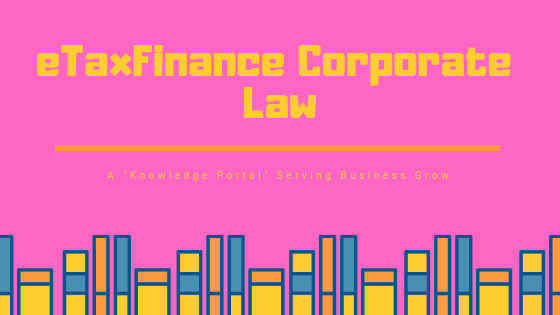When you start a business then you have to make an important decision about the type of business organization to register. There are many types of companies or business entities in India. Every company in India must be registered under the Companies Act 2013. One must choose the best legal structure from permitted models to do business and achieve success.
In India we have 7 major business frameworks, respectively Sole Proprietorship, Partnership, Limited Liability Partnership, Private Limited Companies, Public Limited Companies, One-Person Companies, Section 8 Company.
Types of Business Entities In India
1) Sole Proprietorships
- Sole proprietorship is a type of business substance where a solitary individual handles the whole business association.
- Sole Proprietorship is also known as individual Entrepreneurship.
- It is easy to register this entity.
- In a sole proprietorship, the business and the owner both are the same. When the business owner dies then the business also dies.
- All assets of the business are owned by the business owner.
- He is the sole beneficiary of all benefits and conveyor of all loses.
- The liability of the owner is unlimited.
2) Partnership
- In a partnership firm, two or more people come together to work and earn profits.
- The owners of a partnership firm are individually known as partners and collectively known as a firm.
- Partnership businesses are governed by the Indian Partnership Act, 1932.
- Minimum of 2 and a Maximum of 20 members in your partnership firm.
- It is very easy to start and there is low startup cost.
- The partners are responsible for all liabilities and there is no limit to it.
- There is no separate existence of the business.
- Registration of a partnership it is not mandatory but it is suitable to get it registered.
3) Limited Liability Partnerships
- A limited liability partnership (LLP) is a type of business structure in which the liability of some partners or all partners is limited. No partner is liable for liability or debts created by another partner.
- A Limited Liability Partnership is incorporated under the Limited Liability Partnership Act 2009.
- An LLP can be started with no minimum amount of capital contribution.
- Minimum of 2 members in your partnership firm. There is no upper limit for a Maximum number of partners.
- It is an easy process to start an LLP as compared to a private company, along with lesser legal requirements.
- For Limited Liability Partnership, IT returns needed to be filed. The audit is not compulsory for LLP but if your turnover exceeds 40 lakhs or contribution to LLP exceeds 25 lakhs then an audit is required.
4) Private Limited Companies
- A Private Limited Company in India is a privately held small business entity and considered as an independent legal entity on incorporation.
- It is a separate legal entity registered under the company act, of 2013.
- Minimum of 2 members and a maximum of 200 members.
- Minimum of 2 and a maximum of 15 directors.
- The liability of the shareholders is limited.
- Ownership of the company can be transferred through shares.
- IT returns need to be filed for a Private Limited Company.
- Must hold board meetings.
- It is compulsory to add the word ‘Pvt. Limited’ after the name of the company
5) Public Limited Companies
- A Public Limited Company means a company which is not a private company.
- It is a separate legal entity registered under the company act, of 2013.
- In a Public Limited Company, the shares are offered publicly to the general public. Public limited companies could be listed in the stock market or could be unlisted.
- Shareholders can freely trade their shares.
- Minimum of 7 members required to register a public limited company. There is no upper limit for maximum members in Public Limited Company.
- Minimum of 3 and a maximum of 15 directors.
- The liability of shareholders is limited so they are not personally liable for any debts and losses of the company.
- It is compulsory to add the word ‘Limited’ after the name of the company.
6) One Person Company
- A One Person Company (OPC) is a newly introduced type of company in India since 2013.
- If an individual wants to start a company then this is the best type of company for him.
- This company type is useful for sole entrepreneurs in which the business owner gets full control over his/her company
- Incorporating an OPC is only permitted to a resident of India. No foreigner can incorporate an OPC.
- If the revenue is over 2 crores and paid up capital over 50 lakhs then OPC is needed to be converted into a Private Limited Company.
7) Section 8 Company
- A Section 8 Company is also called as Non-profit Company,
- It is incorporated under the provisions of the Companies Act, 2013
- Section 8 Company have the status of limited company without the addition to its name of the word “Limited” or “Private Limited”
- The purpose is to promote commerce, art, science, sports, education, research, social welfare, religion, charity, protection of environment or any such other object
- The Company shall use its profits or other income in promoting its objects only and prohibit the payment of any dividend to its members as well.
For more details contact out team at +91-7991109093 or drop email us at [email protected]
Note: This Post was last updated on December 6, 2022
Disclaimer: The entire contents of this document have been prepared on the basis of relevant provisions and as per the information existing at the time of the preparation i.e. December 6, 2022. Although care has been taken to ensure the accuracy, completeness and reliability of the information provided, We assume no responsibility therefore. Users of this information are expected to refer to the relevant existing provisions of applicable Laws. The user of the information agrees that the information is not a professional advice and is subject to change without notice. We assume no responsibility for the consequences of use of such information. IN NO EVENT SHALL WE SHALL BE LIABLE FOR ANY DIRECT, INDIRECT, SPECIAL OR INCIDENTAL DAMAGE RESULTING FROM, ARISING OUT OF OR IN CONNECTION WITH THE USE OF THE INFORMATION.


